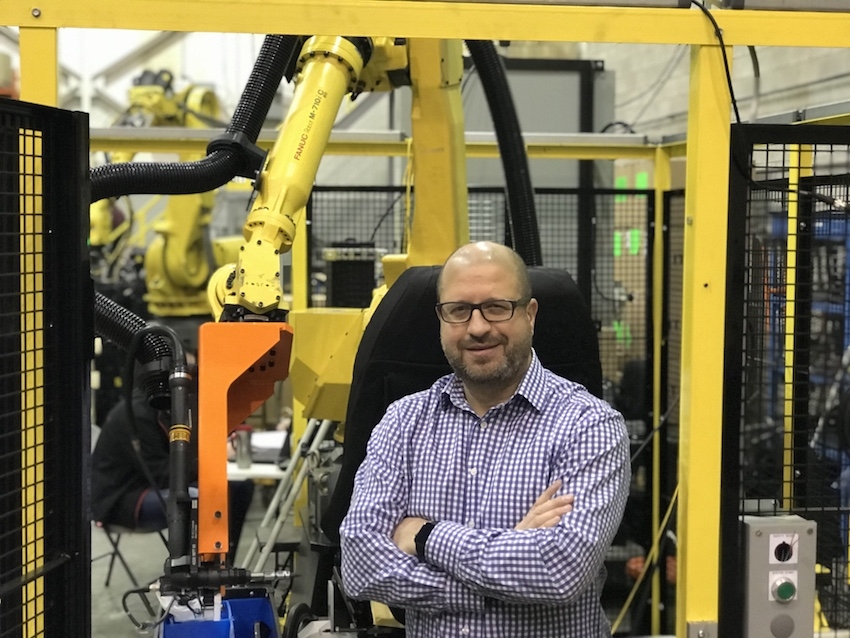
Jan. 29, 2018 – President of Tech-Con Automation, Nino LaDuca, shares his thoughts on some of the opportunities and challenges facing today’s manufacturing industry.
MA: Can you tell me a bit about Tech-Con Automation?
NL: We are a custom equipment machine builder and through an acquisition approximately two and a half years ago, became the Canadian operations of Shape Technologies Group. We build custom automation equipment, which include robotic material handling solutions, systems integration and conveyors for multiple industries such as automotive, food and beverage, aerospace, and consumer goods. We have 70-plus employees in our [Burlington, Ont.] 58,000-square-foot facility. We’ve taken the last two and a half years to invest not only in technology internally – like new engineering and project management tools – but also in some machinery for the shop.
MA: What are your thoughts on today’s manufacturing industry?
NL: I’m a big advocate of the industry. I’m a CPA by trade but I’ve always enjoyed manufacturing and automation. I’m thrilled to see a lot more companies are considering implementing some form of automation into their plants and not just because [employers] want to reduce headcounts but [because they] want to make it a much safer environment for their people.
I get a real kick when customers want to improve efficiency and reduce downtime and costs [because] that’s what we like to do. We like to get our thinking caps on and really look for ways to help customers achieve those goals.
I will say this, there is a huge shortage of skilled labour and I think we’re all starting to suffer from that. I think the baby boomers are slowly starting to retire and they’re the ones [who] have a lot of intellectual capital property in their brains, and there is that gap because we just haven’t been promoting these jobs strongly enough. [Even though] we’re starting to see a lot of kids go to colleges and universities for courses like mechatronics, robotics and automation, we’re still seeing a void right now. Everybody’s fighting for the exact same skill set but it’s refreshing to see that colleges and universities are promoting this skill set. I strongly advocate for the need of automation and with [this] need comes an opportunity for more highly skilled jobs.
MA: Along with implementing these programs and promoting this skill set, what else can we do to help lessen the skills gap?
NL: [We can] give them a chance. For example, we’ve brought in some co-ops here from both high schools and colleges and we are hiring recent graduates to [work] here — we’re really giving them an opportunity to learn the trade. It’s much more than just learning the trade with those technical skills, you have to learn the trade with the soft skills. We have a young individual here and we have assigned him to shadow a much more seasoned individual. He’s been shadowing him for the last six months and he’ll continue to [do so] for the next six months until he’s ready to be on his own and I think that’s what we have to do as employers. [We have to] prepare these recent graduates to be highly effective employees, and we have to give them an opportunity. We can’t just expect for them to walk in here and know what they’re doing. We can’t expect to throw them into the line of fire — we have to hold their hand and give them a great platform to be trained on.
MA: What other challenges do you think are prominent in the manufacturing world?
NL: I would say technology. I think everything is becoming so much more sophisticated out there and you really need to understand how it all works. We have a lot of our suppliers in here for lunch-and-learns and product training because we need to ensure we are up to date on all new products — not just on what they are but what they can do.
I can only speak to what I see but I think there is a lot of traction being made and developed in terms of [Industry 4.0] technology. Shape Technologies, with [help from] the private equity firm that funds [us], has taken on an initiative to develop the Industry 4.0 and Internet of Things for its customers, starting with those in the waterjet space, by [helping them] receive and understand the equipment data so they can track downtime, the causes of downtime, and when maintenance is required. They make long-term investments [in their equipment] and they [see the value] in this data.
The days of trying to lower costs by minimizing headcount are long gone. We certainly have to get more creative with technology and how we do things in order to remain competitive.
This profile was originally published in the January/February 2018 issue of Manufacturing AUTOMATION.
Advertisement
- AutomationDirect adds Nitra pneumatic rotary actuators and grippers
- ArcelorMittal commits $70M to modernize Quebec steel mills
